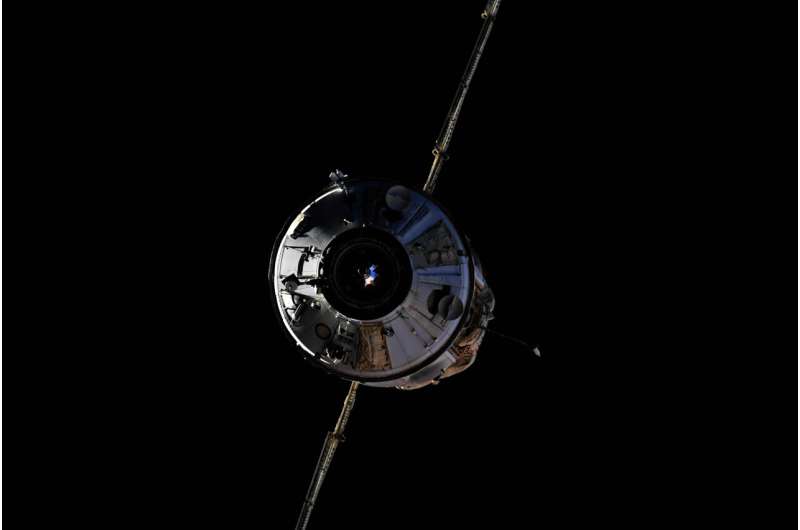Russia says software malfunction caused Nauka module to unexpectedly fire thrusters, tilt space station
You call this a glitch?
Russia said a "software failure" caused its Nauka module to suddenly and unexpectedly fire its thrusters after docking with the International Space Station this week.
The engine burn caused the orbiting lab to tilt 45 degrees at a rate of about half a degree a second. The station automatically fired thrusters on its Russian Zvezda module and an attached Progress cargo craft to compensate, creating a brief tug of war between the module and the station.
After about an hour, officials were able to regain attitude control. Commands were sent to Nauka to not only shut off the thrusters but ensure they cannot inadvertently fire again. NASA insisted the seven astronauts onboard the ISS were not harmed nor in any real peril during the undesirable thruster burn, which started at 1634 UTC on Thursday.
Russia's Roscosmos today shed some more light on what went wrong. We're told Nauka, also known as the Multipurpose Laboratory Module, had about three hours earlier docked with the station after a problematic rendezvous. The module, which was built on and off over the past 25 years, suffered significant issues with its propulsion and other systems as it approached the ISS yesterday. It had lifted off from the Baikonur Cosmodrome in Kazakhstan on July 21.
"On July 29, the Nauka Multipurpose Laboratory Module was docked with the International Space Station," said Roscosmos bigwig Vladimir Solovyov, who oversees the Russian part of the ISS.
"At all stages of the module's flight, its rendezvous system worked reliably and stably," the cosmonaut continued, putting the best positive spin possible on the situation. "During the final rendezvous, slight fluctuations were noticed, which were eliminated by the docking system. This resulted in smooth docking and touchdown at rated speeds, which in turn resulted in mechanical coupling."
After Nauka was attached to the space station, the module's software incorrectly made its thrusters fire for separation, we're told.
"The docking mechanics worked reliably, without any comments and led to the closure of both docking mechanisms of the station and the module," Solovyov said.
"Due to a short-term software failure, a direct command was mistakenly implemented to turn on the module's engines for withdrawal, which led to some modification of the orientation of the complex as a whole.
"This situation was quickly countered by the propulsion system of the Zvezda module. At the moment, the station is in its normal orientation, all the ISS and the multipurpose laboratory module systems are operating normally. A reliable internal power and command interface was created, as well as a power supply interface that connected the module to the station."
The next steps involve ensuring the station is A-OK and functioning properly after this mishap, or as Roscomos put it, "completing a set of procedures with the Nauka module propulsion system to ensure unconditional safety of the International Space Station and the entire crew."
The Nauka module will also be prepared for use by the station's inhabitants. It is set up to host science experiments, and sports an airlock for space walks and a docking port for visiting craft. Russia ditched its Pirs module from the space station to allow Nauka to slot in.
"The crew is now busy balancing the pressure in the Nauka module," said Solovyov. "This is a rather lengthy procedure, because the total volume of the module is about 70 cubic meters. In the afternoon, the crew will open the hatches, enter the module, turn on the necessary means of purifying the atmosphere and begin normal regular work."
As a result of this drama, Boeing's launch of its unmanned Starliner spacecraft to the ISS has been put off until August 3 at the earliest. ®
- Mutton and Karlston
-

 2
2



Recommended Comments
There are no comments to display.
Join the conversation
You can post now and register later. If you have an account, sign in now to post with your account.
Note: Your post will require moderator approval before it will be visible.